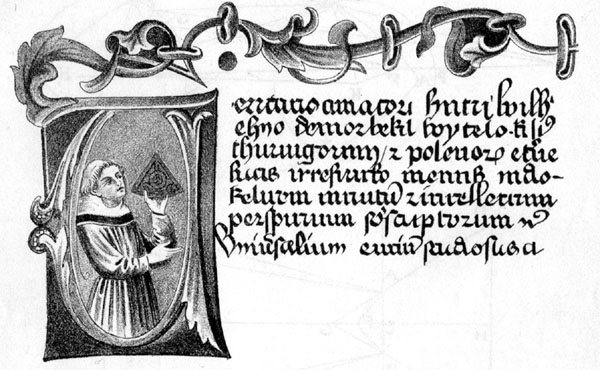Prominent Poles
Witelo (aka Erazmus Ciolek, Witelon, Vitellio, Vitello, Vitello Thuringopolonis, Erazm Ciołek), friar, theologian, natural scientist, precursor of perception psychology. Note: the same name, Erazm Ciolek, also had the bishop of Plock (born 1474) and the bishop suffragan of Cracow (born ca. 1492).

Born:ca. 1230 probably in the village of Borek or in Legnica both in Lower Silesia
Died: after 1280, before 1314.
Early days. Witelo's mother was from a Polish knightly house, while his father was a German settler from Thuringia. Witelo called himself, in Latin, Turingorum et Polonorum filius�"a son of Thuringians and Poles.� He attended a monastery school in Legnica. He studied next at Padua University around 1260, then went to Viterbo, the site of a Papal palace.
Work. He became friends with William of Moerbeke, the translator of Aristotle. In Perspectiva, Witelo's major surviving work on optics completed in approximately 1270-1278 he refers to other works that he had written. Most of these do not survive, but De Natura Daemonum and De Primaria Causa Paenitentiae have been recovered. Perspectiva was largely based on the work of the Arab polymath Alhacen (Ibn al-Haytham; d. ca. 1041) Kitab al-manazir (The Book of Optics; De aspectibus or Perspectivae). In it Witelo analyzed rectilinear propagation of light, its reflection, refraction and dispersion. His work powerfully influenced later scientists, in particular Kepler, Huygens and Descartes and was printed in 1572 in the Friedrich Risner edition Opticae thesaurus: Alhazeni Arabis libri septem, nuncprimum editi; Eiusdem liber De Crepusculis et nubium ascensionibus, Item Vitellonis Thuringopoloni libri X. Lorenzo Ghiberti's Commentario terzo (Third Commentary) was based on an Italian translation of Perspectiva. Witelo's treatise also contains much material in psychology, outlining views that are close to modern notions on the association of ideas and on the subconscious. Perspectiva also includes Platonic metaphysical discussions. Witelo argues that there are intellectual and corporeal bodies, connected by causality (corresponding to the Idealist doctrine of the universal and the actual), emanating from God in the form of Divine Light. Light itself is, for Witelo, the first of all sensible entities, and his views on light are similar to those held by Roger Bacon. Witelo spent considerable time in Wroclaw. In 1274 he became an emissary of Henryk IV Probus , Duke of Cracow, to the Pope Johannes XXI. Later he probably taught in the parochial school of St.Peter and Paul in Legnica. He also constructed devices for drafting the curves.
Honors. 1935: A crater on the Moon, Vitello, is named after Witelo; a higher trade schoole in Legnica is named after him; Witold Jablonski has written (2003-2007) a cycle of novels named Gwiazda Wenus, gwiazda Lucyfer with Witelo being the main character.
Sources:
This article uses, among others, material from the Wikipedia article "Witelon" licensed under the GNU Free Documentation License. :
Wikipedia (in Polish)
Encyclopedia Britannica Online
Return to home page:
Prominent Poles
